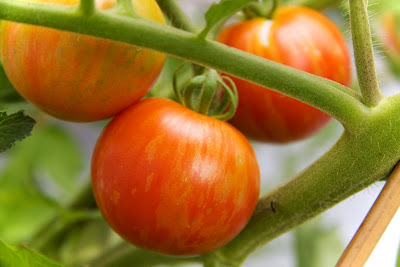 |
| Keep on sowin'! |
If I was exhibiting my normal patterns, I probably would have called it quits by now. I apparently love quitting, and I do it very well. The nights have been colder, the leaves are beginning to dry and drop, and much of the garden has given me all it has to give. Under ordinary circumstances, I'd have grown tired of my microfarming efforts and thrown in the trowel. But here's the thing - the garden has made me different. In a single summer, I've gained a deeper, personal understanding of growing, and of the incredible rewards that are reaped through patience and persistence. Sure, I was intellectually aware of these things before... I went to school for horticulture, you know! But there is a substantial difference between "knowing" something because you read it or were taught it, and really knowing something because you experienced it yourself. There is truly no substitute for first-hand knowledge.
For me, the approach of Fall always leads to a period of nostalgia. It's a time of conclusions and of new beginnings. I've been reflecting on the season, and I'd like to share a few of the things that I learned. I mean really learned, this summer.
1. Keep on sowing. All the time. Whether you want to or not.
 |
| Mid-season seeds for late-season lettuce. |
|
I had a few major gaps in my garden's production because I neglected to follow this rule. I was so thrilled with my carrots and beets as I pulled them from the ground, but as my supply dwindled, I realized with dismay that I would have been able to enjoy them ALL season if I had simply sown more in succession. The varieties I grew take about 65-75 days to reach harvest size, and I really dropped the ball on that one. Lesson learned, however - I sowed fresh lettuce in August that is now almost ready to cut for baby greens.
2. Expect problems. Embrace the chance to learn.
 |
| What the hell?!? Tomato trouble led to research and change. |
|
|
|
|
 |
| Cracking fruit makes Kris cry. |
In late July, my tomatoes were just starting to ripen and I was elated. Then they got all bitchy on me. Brown spots, curled leaves, dropping flowers, cracking fruit... what the hell?? I hit the forums and cracked open my books, looking for the solution to my problems, which I suspected were fungal. The tricky part is that often garden problems can be caused by multiple factors - weather, water, humidity, diseases, insects, human error... the list is endless. My book told me that the best course of action was to immediately destroy the affected plants, thus reducing the likelihood that the problem would spread to my other tomatoes. Sound advice, yes, but I didn't like it. Instead, I removed all of the spotted foliage, cut off the troublesome branches, and fertilized my sick plant with an organic mix high in phosphorus to try and coax some fresh flowers and fruit. It worked. Was I right and the book wrong? Do I possess healing powers? Not likely. Next time, it may not work out so well, but at least I have some weapons in my arsenal that I devised from first-hand experience.
3. You will always make mistakes. It's ok. Write them down!
My peas needed more sun. My cucumbers did terribly because they needed more space. I don't really like dry beans, so I probably shouldn't grow them. I need more herbs, peppers and greens and way fewer tomatoes. Eggplant seedlings need to be started in January, because they are sssllllooooowwwww. I'm not ashamed that many of my backyard endeavors didn't work out this year, but I'm determined not to repeat the same mistakes. After all, I need to save room for NEW mistakes!
4. Share the load, share the harvest, and share the joy.
 |
| Farmer A. |
|
 |
| Farmer C. |
|
|
One of the greatest things about growing food is that it fosters connections. You connect with the earth. You connect with a real food source and a sense of sustainability. You connect with people, both familiar and strange. Sharing the work of Mo Farm has been vital, and sharing the JOY of Mo Farm has been life-changing. I'm so lucky and so grateful to have been able to depend on my sister and my husband for a hand in the dirt.
These are just a few of the things that this garden has taught me this season. I know now that this is a way of life for me. It's not a phase, a fad, or a hobby. Growing food is something that I'll always do.
And baby, it ain't over til it's over.
The sun is still shining, the vines are still full, and I've got work to do. Time to get these hands dirty!










